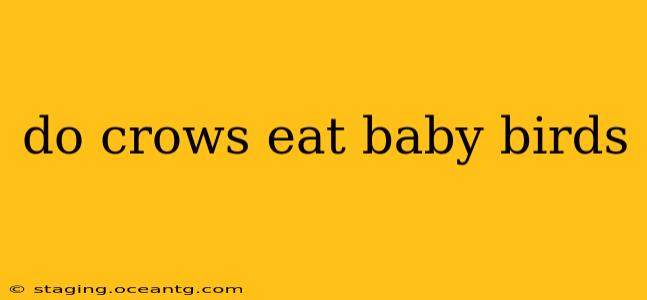Crows, known for their intelligence and adaptability, occupy a fascinating niche in the avian world. Their diet is surprisingly diverse, and the question of whether they eat baby birds is a complex one, demanding a closer examination of their predatory behavior and ecological role. The short answer is: yes, crows can and sometimes do eat baby birds. However, it's not their primary food source, and several factors influence this behavior.
What Do Crows Typically Eat?
Before diving into the specifics of crow predation on baby birds, it's crucial to understand their general diet. Crows are omnivores, meaning they consume both plants and animals. Their diet varies seasonally and geographically, but generally includes:
- Insects: Beetles, grasshoppers, caterpillars, and other insects form a significant part of their diet, especially during the breeding season when they need extra protein to feed their young.
- Fruits and Berries: Crows readily consume various fruits and berries, contributing to seed dispersal in their environment.
- Nuts and Seeds: These provide essential fats and carbohydrates, especially during winter months.
- Carrion: Crows are opportunistic scavengers and will readily consume dead animals, helping to maintain ecosystem hygiene.
- Small Vertebrates: This is where the question about baby birds comes in. While not their staple food, small mammals, reptiles, amphibians, and yes, occasionally baby birds, can become prey.
Why Do Crows Eat Baby Birds?
Several factors contribute to crows preying on baby birds:
- Opportunity: If a crow encounters a nest with vulnerable young, especially those that have fallen from the nest or are poorly protected, they may seize the opportunity for an easy meal.
- Nutritional Needs: Baby birds are rich in protein and fats, providing essential nutrients for the crows themselves or their growing chicks. This is particularly true during the breeding season.
- Territory: In some instances, crows may target nests of competing bird species to eliminate rivals and secure resources within their territory.
How Often Do Crows Eat Baby Birds?
It's difficult to put an exact number on how frequently crows prey on baby birds. It's not a common occurrence, and their diet is far more varied. However, it's certainly a behavior observed in the wild, and the frequency likely varies based on factors like food availability and population density.
Do crows only eat baby birds?
No, crows have a highly varied diet and baby birds are only one small component of it. They are opportunistic feeders, and their diet is highly adaptable based on what's available.
Are crows dangerous to other birds?
While crows can prey on baby birds, it's not their primary way of interacting with other avian species. They are more likely to compete for resources like food and nesting sites than actively hunt down adult birds.
What can I do to protect baby birds from crows?
If you are concerned about crows preying on baby birds in your area, some measures you could consider include:
- Protecting nests: Ensuring nests are well-camouflaged and inaccessible to predators can help.
- Providing alternative food sources: Offering food for crows elsewhere in your yard might draw them away from bird nests.
- Installing deterrents: Certain deterrents might make your yard less attractive to crows. However, it's important to consider the ethical implications of any deterrent used.
Conclusion
While crows do sometimes eat baby birds, it's not a regular part of their diet. They are highly adaptable omnivores with a broad range of food sources. Their predation on baby birds is usually an opportunistic behavior influenced by factors like food availability and the vulnerability of the young birds. Understanding their dietary habits provides a crucial insight into their ecological role and importance within the wider ecosystem.
